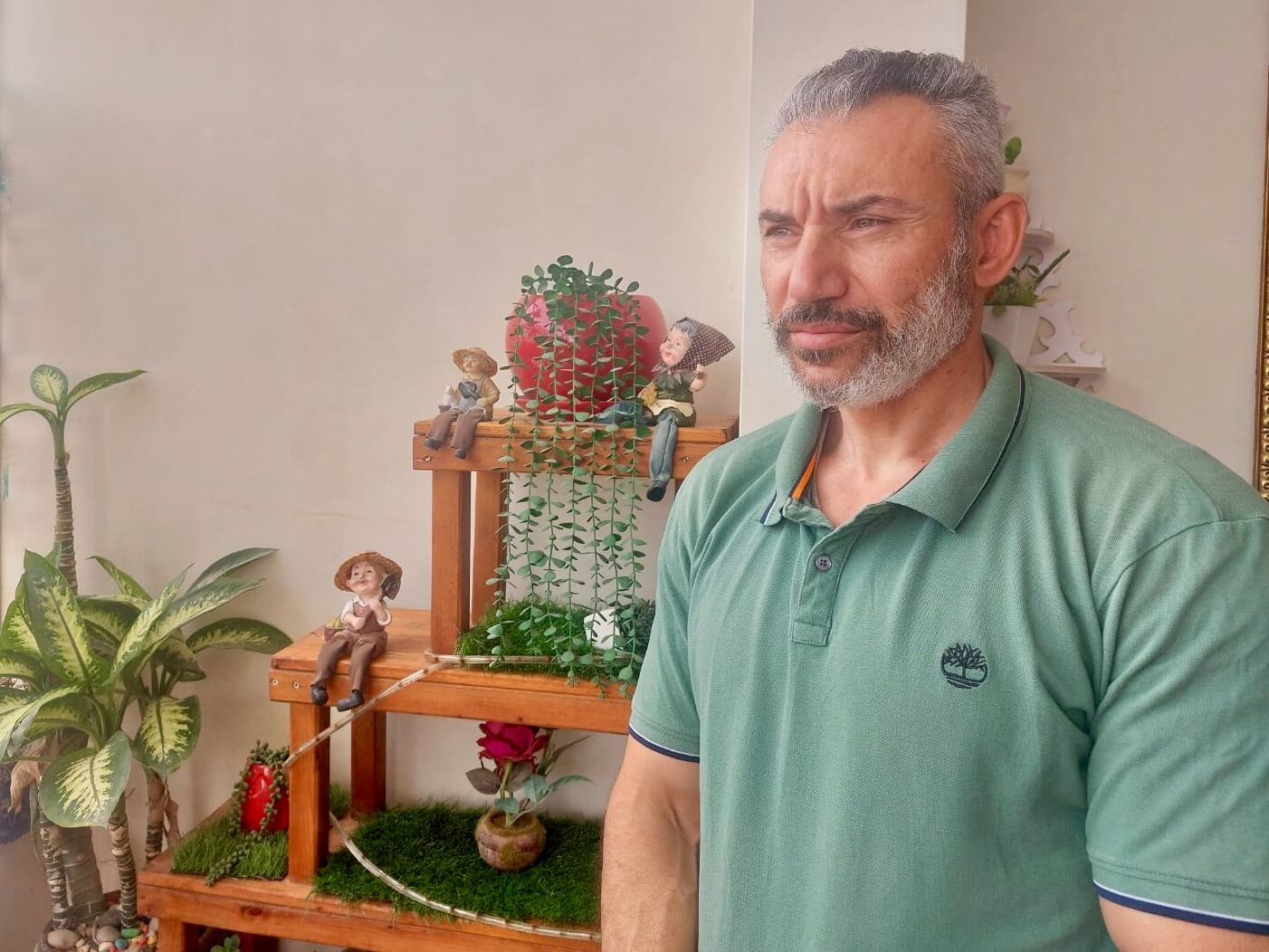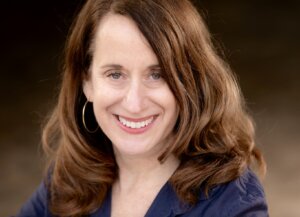Joint Israeli-Palestinian Memorial Day ceremony calls for sharing grief, not keeping score
‘No matter how many people you lose,’ said a Palestinian who has seen 61 relatives killed in Gaza, ‘The feeling is the same’

Ahmed Alhelou of Jericho is among the speakers at Israel’s joint Israeli-Palestinian Memorial Day ceremony. Israel won’t let him enter the country from the occupied West Bank, so he gave his remarks via video. Photo by Courtesy of Ahmed Alhelou
TEL AVIV — In this week leading up to Memorial Day, Israel’s government has been focusing on death tolls.
In news briefings, releases and interviews, officials have pointed out that Israel has never seen more civilians killed in a single year than this year’s 822, and that the only time Israeli security forces suffered more fatalities than this year’s 760 was during the Yom Kippur War in 1973.
The government does not mention the much higher number of war deaths in Gaza since the Hamas terror attack on Israel Oct. 7: nearly 35,000, according to the Hamas-run health ministry.
Organizers of the annual joint Israeli-Palestinian Memorial Day ceremony, though, say that what counts most is that people come together, not around death tolls but in grief.

“Pain is pain, and we need to share it,” said Ahmed Alhelou, 52, of Jericho.
He ought to know. By his last count, at least 61 members of his and his wife’s families in Gaza have been killed by Israeli strikes since October. After many months, some of their bodies haven’t been pulled from the rubble.
“No matter how many people you lose — one people, 60 people — the feeling is the same,” Alhelou said.
He works in the Palestinian Authority’s planning office and is active with Combatants for Peace, a group of Palestinians and Israeli Jews seeking to end the occupation. For 19 years, they’ve collaborated with families who have lost loved ones in the conflict to organize a joint Memorial Day service that doesn’t treat war as the inevitable cost of securing a Jewish state, nor honor its victims as martyrs. Rather, the ceremony — this year’s will be streamed online Sunday at 1:30 p.m. ET — is meant to harness their collective mourning, underscore the pointlessness of war and, as Alhelou put it, let people “stand united to end the bloodshed.”
Israel’s Memorial Day — in Hebrew, Yom HaZikaron — starts Sunday at sundown. As always, there will be a one-minute siren throughout the country that evening, and a two-minute siren the next morning, followed by ceremonies at 53 military cemeteries nationwide. The government, citing security concerns, has limited the number of people allowed at its annual event on Jerusalem’s Mount Herzl, and is asking the public to let soldiers and members of bereaved families take priority in filling the slots.
Some relatives of those killed on Oct. 7 have asked politicians not to attend Memorial Day events because they blame the government for the intelligence failures that allowed the Hamas attack and the relatively slow response to it.
Last year’s joint Palestinian-Israel ceremony drew about 15,000 people to a park in Tel Aviv, organizers told me, plus nearly 200,000 viewers online. This year, they had to adjust their plans because Israel would not give many Palestinians who live in the occupied West Bank — including Alhelou, who is one of the speakers — permits to attend. So the ceremony was pre-recorded on Wednesday at a location organizers insisted remain secret beforehand, for security reasons, and even now, lest the government punish the host organization by yanking its funding.
The invitation-only audience included mainly Combatants for Peace members and relatives of terror victims like Zehava Oren, who was killed in a suicide bombing of a bus in 1995.

“It’s not enough just to remember the dead,” said Oren’s daughter, Galit. “We need to honor their memory by looking forward and choosing reconciliation. If we could have achieved that years ago, maybe we would have avoided this situation.”
Galit’s teenage daughters also spoke at the ceremony about the grandmother they never got to meet.
Also on stage was Yonatan Ziegen, a son of the peace activist Vivian Silver, who was killed on Kibbutz Be’eri on Oct. 7. He told me beforehand that he sees the joint ceremony as the “only appropriate way” to honor her life’s work. Observing Memorial Day, he said, should be an exercise in “humanity and compassion, not nationalism.”
Then there was Michal Halev, whose 20-year-old son, Laor Abramov, was among the hundreds killed at the Nova music festival. “No more revenge, no more killing,” she told the somber audience, moving many to tears.
“There are no victors in this war,” she added. “We have all already lost.”
The taping unfolded against a background of on-again, off-again negotiations for a ceasefire; confirmation that the U.S. was withholding weapons shipments to Israel out of concern for its planned assault on the southern Gaza city of Rafah; and ongoing protests on college campuses in the United States.
As the ceasefire negotiations in Cairo fizzled out, Alhelou told me that a lifetime under Israeli occupation has made him question what “peace” would even look or feel like.
The speech he pre-recorded from his home in Jericho gave voice to his two older sisters, who have bounced with their families like pinballs throughout Gaza trying to flee Israeli airstrikes. He spoke on behalf of his cousins Sumaya, Hadeel, Thafer, Lara, An’am and Abd Alrahman Alhelou, all killed when their homes were bombed. He talked about Sa’ad Allah Muhammad, Sa’ad Allah Ihab, Hiba Ihab and Iman Alhelou, whose bodies he said remain under the ruins because nobody has been able to dig them out.
Alhelou’s dead family members include a doctor, a teacher and a scholar. Maybe, he told me, Israeli Jews would have valued their lives if they knew that among the women were a nurse, a physician and an engineer.

Maybe these Israelis would appreciate that he opposes violence, extremism and terror of any kind, he said, and that he feels “shame, sick shame about the civilians, the women and children murdered and hostages taken” on Oct. 7. But he acknowledged that many would likely be alienated or stop listening altogether when they hear that he told me he understands why Hamas attacked Israel on Oct. 7.
“They were looking for liberation from occupation,” he said during our interview. “All Palestinians are.”
Alhelou broke down twice during our phone conversation — once when conveying the smell of death that surviving relatives in Gaza have described to him, and again when talking about the dogs in Gaza roaming around looking for their lost people. He said he feels “scared all the time about my family, my family in Gaza,” and that “sometimes I stay up all night just crying with myself.”
“For sure people look to me as a weakness guy, or a scared guy, or a give-up guy because I say things, I say these are the hardest days I’ve visited in my life during my 52 years,” he continued.
“No time has been harder than this time, not for any of us,” he added, including Israeli Jews, who he sees as “also victims of the occupation” who, like him, “want to live just a normal life.”
Alhelou realizes it will take a lot more than a Memorial Day ceremony to bring a ceasefire and stop the death toll from rising further. He also knows you don’t end wars by keeping score.
He said he hopes that the taped service he could not attend in person will cut through the war rhetoric and disembodied statistics so that Palestinians’ pain reaches Israeli Jews and Israelis’ pain reaches Palestinians this Memorial Day.
After seven months of war, that common pain may be all that still connects them. If it goes unspoken, and if it lasts much longer, he said, it’ll turn to numbness.
“We stop crying. No tears. After that, we lose the feeling for anything,” Alhelou told me. “For each other. For ourselves.”
That’s what war does, he said. And that’s what he’s most afraid of.
A message from our Publisher & CEO Rachel Fishman Feddersen

I hope you appreciated this article. Before you go, I’d like to ask you to please support the Forward’s award-winning, nonprofit journalism so that we can be prepared for whatever news 2025 brings.
At a time when other newsrooms are closing or cutting back, the Forward has removed its paywall and invested additional resources to report on the ground from Israel and around the U.S. on the impact of the war, rising antisemitism and polarized discourse.
Readers like you make it all possible. Support our work by becoming a Forward Member and connect with our journalism and your community.
— Rachel Fishman Feddersen, Publisher and CEO




























